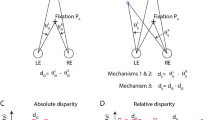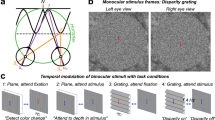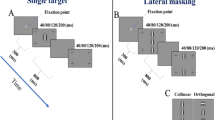Abstract
HERE I report results which reveal a new form of binocular stereopsis sensitive to delays between the arrival of common input to both eyes instead of retinal disparity.
This is a preview of subscription content, access via your institution
Access options
Subscribe to this journal
Receive 51 print issues and online access
$199.00 per year
only $3.90 per issue
Buy this article
- Purchase on Springer Link
- Instant access to full article PDF
Prices may be subject to local taxes which are calculated during checkout
Similar content being viewed by others
References
Julesz, B., Bell System Tech. J., 39, 1125 (1960).
Hering, E., Outlines of a Theory of the Light Sense, Trans. from German original, of separate sections (Harvard University Press, 1964).
Ross, J., and Hogben, J. H., Vision Res. (in the press).
Uttal, W., Percept. and Psychophys., 6, 121 (1969).
Julesz, B., Foundations of Cyclopean Perception (University of Chicago Press, Chicago, 1971).
Author information
Authors and Affiliations
Rights and permissions
About this article
Cite this article
Ross, J. Stereopsis by binocular delay. Nature 248, 363–364 (1974). https://doi.org/10.1038/248363a0
Received:
Published:
Issue Date:
DOI: https://doi.org/10.1038/248363a0
This article is cited by
-
A new method to create depth information based on lighting analysis for 2D/3D conversion
Journal of Central South University (2013)
-
Joint-encoding of motion and depth by visual cortical neurons: neural basis of the Pulfrich effect
Nature Neuroscience (2001)
-
Stereoscopic depth perception at high velocities
Nature (1995)
-
Field processes in stereovision
Documenta Ophthalmologica (1987)
-
Perceptual effect of pursuit eye movements in the absence of a target
Nature (1978)
Comments
By submitting a comment you agree to abide by our Terms and Community Guidelines. If you find something abusive or that does not comply with our terms or guidelines please flag it as inappropriate.



